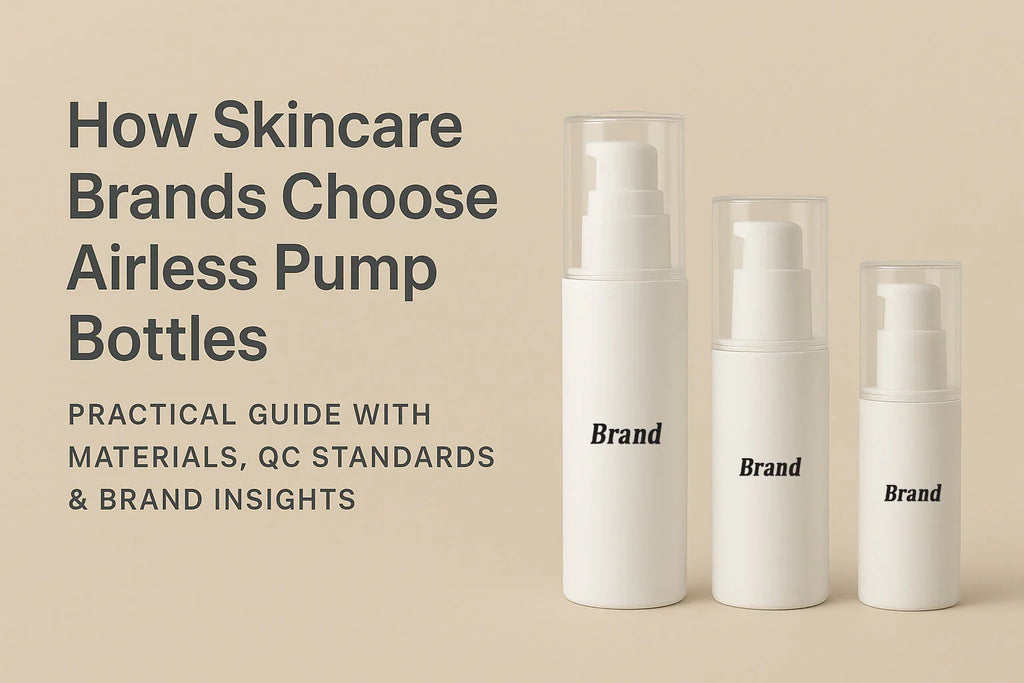Search
-
-
How to Customize ...
Dec 11, 2025 -
Eco-Friendly Perf...
Dec 01, 2025
Archive
- December 2025
- November 2025
- October 2025
- September 2025

How Top Skincare Brands Choose Airless Pump Bottles?
Practical Guide with Materials, QC Standards & Brand Insights
As skincare formulas evolve with higher actives and cleaner ingredients, airless pump bottles have become a preferred choice for premium serums, essences, and creams. Beyond their sleek appearance, airless systems play a critical role in formula protection and product performance.
This guide explores how beauty brands select the right airless pump packaging — based on factory experience — so you can make confident decisions for your next launch.
Why Airless Pumps Are Rising in Skincare Packaging
Modern skincare increasingly focuses on:
-
High-activity ingredients (retinol, peptides, niacinamide)
-
Minimal-preservative or “clean beauty” formulations
-
Lightweight, serum-based textures
-
Premium consumer experience
Airless packaging supports these innovations by offering:
-
Air-free dispensing — protects formulas from oxidation
-
Better hygiene — reduces contamination risk
-
Precise dosage control
-
Improved formula stability & longer shelf life
-
Premium unboxing and user experience
In 2026, airless packaging is expected to be used in the majority of new serum and treatment launches across leading skincare markets.
Choosing the Right Airless Bottle Material
Different packaging materials deliver different performance & aesthetics. Below is a practical comparison:
| Material | Appearance | Key Benefits | Ideal For |
|---|---|---|---|
| PP | Matte, clean | Recyclable, lightweight | Clean beauty & sustainable lines |
| PETG | Clear, glossy | Excellent transparency & impact resistance | Serums & essence products |
| Acrylic | Glass-like luxury | Premium, heavier, display quality | High-end skincare collections |
Recommendation: For active skincare formulas, PETG outer + PP inner balances performance and luxury.
Key Factors Beauty Brands Consider
When selecting airless packaging, successful brands evaluate:
-
Compatibility with formula viscosity
-
Pump dosage & dispensing smoothness
-
Air-tightness performance
-
Aesthetic fit with brand identity
-
Sustainability requirements
-
MOQ & customization flexibility
A strong supplier will support you in testing — especially for formulas with vitamins, acids, or probiotics.
Avoid These Common Mistakes
| Mistake | Result |
|---|---|
| Choosing design over functional pump quality | Clogging or inconsistent dosage |
| Skipping compatibility tests | Formula discoloration or separation |
| Ignoring vacuum & sealing performance | Reduced shelf life |
| Using overly customized mold too early | Higher cost & launch delays |
Tip: Always request pump smoothness test & formula compatibility test before bulk order.
Factory QC checklist for Airless Pumps
To ensure consistent performance, the inspection includes:
-
Vacuum seal integrity test
-
Pump stroke & rebound test
-
Dispensing consistency test
-
Material & formula compatibility check
-
Drop & transport safety test
These steps ensure the product protects your formula and performs reliably from first pump to last.
Lead Time, MOQ & Custom Options
| Item | Details |
|---|---|
| MOQ | 1,000 – 10,000 pcs |
| Lead Time | 20 – 35 days depending on decor |
| Customization | Color, texture, pump dosage, collar, finish |
| Samples | Recommended for formula testing |
Cost Optimization Tips
You can maintain premium quality while controlling cost by:
-
Using classic bottle shapes vs fully custom molds
-
Choosing single-color decor for clean luxury look
-
Selecting PP instead of acrylic caps
-
Ordering full sets vs mixing components across suppliers
Smart design makes your brand look premium without unnecessary cost.
Conclusion
Airless pump systems are more than packaging — they are part of formula protection and brand experience. Understanding material choices, pump mechanics, and testing requirements ensures your product performs exactly as intended.
At SNPACKS, we support beauty brands with reliable airless packaging solutions engineered for formula integrity, aesthetic impact, and production efficiency.
Whether you're launching a new skincare line or upgrading existing packaging, our team is here to support you with samples, testing guidance, and tailored recommendations.
Related Resources: Airless Pump Packaging
Contact us
Add: Building 7, Bairui Wuhuan Industrial Park, Taxi Road, Jinghe Street, Dongxihu District, Wuhan City, Hubei Province 430040, China
(+86)18963979371
(+86)027-83372627
info@snpacks.com









